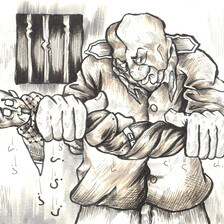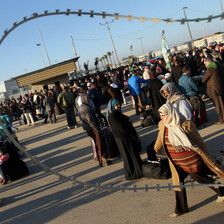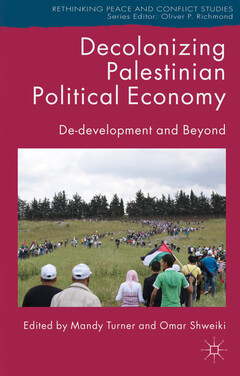The Electronic Intifada Jerusalem 30 December 2013

Palestinian children born in Jerusalem are caught in a web of Israeli bureaucracy and discriminatory restrictions.
APA imagesIn Israeli-occupied East Jerusalem, thousands of Palestinian children born to parents who hold different types of identity cards often live their entire youth unregistered and without any form of citizenship or identity documents.
“It’s very hard … we walk around paranoid all the time,” said Fidaa Shweiki, whose four children are unregistered. “Because Israel has not allowed me to register the children, it has caused us a lot of problems in many areas of our lives.”
The Civic Coalition for Jerusalem has estimated that around 10,000 Palestinian children in East Jerusalem are unregistered (“Jerusalem: General facts and statistics” [PDF]).
Considered stateless under international law, Palestinian residents of Jerusalem hold a special Israeli-issued identity card, as well as Jordanian travel documents.
Shweiki comes from the al-Thuri area of Jerusalem, where her children — two boys and two girls aged between 18 months and nine years — were born in a local hospital. The children have no identity documents other than a slip of paper acknowledging that they were born in Jerusalem.
The document is not a birth certificate and does not include an identification number.
Shweiki’s late husband Anwar Khalil Abed Rabbo was from the town of Yatta in the occupied West Bank and held identification documents issued by the Palestinian Authority.
Husband’s killing
Abed Rabbo, just 27 years old at the time, was with another Palestinian man when both were shot and killed by an Israeli truck driver in al-Samu, a village near Hebron, in 2012. The Israeli military claimed that the two were trying to rob the driver.
Yet Shweiki insisted that Abed Rabbo was on his way to join her in Jerusalem for the birth of their youngest child that same day. Because Israel continuously denied him entry permits to visit his wife, he used to sneak into Jerusalem.
Shweiki believes that her husband’s killing may have resulted in the Israeli authorities’ unwillingness to grant even the youngest child access to Israel’s national healthcare system, despite numerous appeals. “The national health insurance inspectors have come to visit us more than ten times, and sometimes they come on surprise visits to make sure we actually live in Jerusalem.”
Though Shweiki has demonstrated that Jerusalem is her family’s sole home, the Israeli authorities have continued to reject them.
Mohammad Abbasi, Shweiki’s lawyer, explained that Palestinian parents of unregistered children are required to complete numerous registration applications through Israel’s ministry of defense before they can take the issue to court.
Shweiki has provided Israeli authorities with “several documents” proving that she has lived and worked in Jerusalem consistently, though she has been accused of moving elsewhere in the West Bank.
“The Israeli authority tells us that Fidaa’s father owns a house in al-Ram,” said Abbasi, referring to a Palestinian part of Jerusalem situated beside Israel’s wall in the West Bank. “But the house isn’t hers, she’s never lived there. So what does that have to do with her?”
Shweiki said, “I’ve been dealing with this problem since my first kid was born almost ten years ago, but they still say I don’t live here.”
“No other choice”
“Only once she has exhausted all avenues in the ministry [of defense] can she take her issue to court,” Abbasi told The Electronic Intifada. “We’ve been denied many times already. At present, we are waiting for the latest appeal, which was submitted ten days ago. If it’s denied then we’ll try in the courts because we have no other choice.”
Because they are unregistered, her children are denied access to basic services. “They cannot get health insurance, [nor can they] travel abroad or within Palestine,” Abbasi said, noting that the children cannot visit family in the West Bank because they will not be able to return to Jerusalem without identification documents.
If her children were to become sick and require medical treatment, Shweiki would have to pay the full medical fees by herself. “It’s very expensive and I cannot pay it out of pocket. Thank God we haven’t had any major health issues so far.”
Abbasi said that for the time being, Shweiki’s children were legally permitted to stay with her in Jerusalem. But once they turn 16, they will not be able to attain residency status. Instead, they will have to apply for entry-permits — contingent on extensive Israeli “security checks” that often last a year — to visit their mother.
Although three of Shweiki’s children are in elementary school, they will not be allowed to register for high school or university if they do not first obtain the requisite Israeli-issued Jerusalem identity documents.
She explained that the children of her brother, who is married to a foreign national, have been prevented from registering in school because they are also unregistered.
Pushing Palestinians out
Palestinian families holding different identification documents are systematically divided by discriminatory laws, such as the “temporary order” known as the Citizenship and Entry Law.
“Israel’s ban on family unification and continuous barriers to child registration for families in Jerusalem exist alongside its many other policies working to divide families and diminish quality of life for Palestinians in the city,” Rima Awwad of the Jerusalemites Campaign told The Electronic Intifada.
As part of Israel’s ongoing process of expelling the city’s indigenous Palestinian residents to make way for the expansion of Jewish-only settlements, a web of bureaucracy frustrates every aspect of Palestinian life in the city.
Awwad said that Israeli policies “serve to achieve its demographic goal of Judaizing the city by dividing Palestinian families and diminishing the quality of their lives.” The policies included “settler expansion and violence, home demolitions, and rising poverty and unemployment rates,” she added.
Furthermore, the Israeli human rights group B’Tselem has estimated that between 1967 and 2012, Israel revoked the residency of over 14,000 Palestinian residents of East Jerusalem, forcing them to leave (“Statistics on revocation of residency in East Jerusalem,” updated August 2013 [PDF]).
A recent policy brief published by Al-Shabaka noted that similar registration restrictions remain in place on Palestinian children in the occupied West Bank and the Gaza Strip despite the establishment of the Palestinian Authority in 1994 (“Decades of displacing Palestinians,” 18 June 2013).
Additionally, Israel recently introduced a new policy to stop issuing birth certificates to children born in Israel to foreign nationals, the Israeli newspaper Haaretz has reported (“Israel to stop issuing birth certificates to children of foreigners,” 20 November 2013).
Though she intends to continue fighting to register her children, Shweiki is not optimistic. “Why should I have hope? There’s no hope in [Israel’s] courts,” she said, explaining that she and her children would stay in Jerusalem no matter the results.
“I’ll leave them unregistered, but we’re not going anywhere. The kids were born in Jerusalem and this is our home. Our family has 17 people living in the same small house so that we can stay in our city.”
Patrick O. Strickland is an independent journalist and frequent contributor at The Electronic Intifada. Find his writing at www.patrickostrickland.com, and follow him on Twitter @P_Strickland_.




